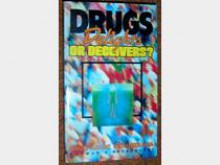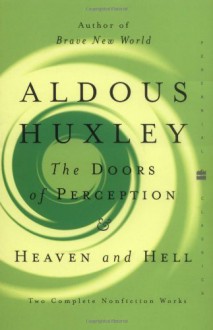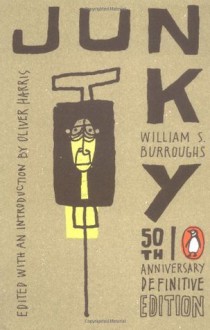
Why is it that some drug users seem to collect books that warn them against taking drugs? Okay, I am not a drug user, though based upon this book (and this is probably the one thing that I actually liked about this rather sensationalist book), the definition of drug is actually cast very wide and includes prescription drugs (such as pain killers), tobacco, and alcohol, which is different to a lot of other sensationalist anti-drug books which tend to focus only on the illegal drugs.
Okay, I should admit that back in my much younger days I was a significant drug user, and I probably picked this book up around then, maybe with the intention to laugh at what I considered to be, back then, sensationalist rubbish (I still do). The thing with myself and the group of friends that I used to hang around with (who, by the way, were also significant drug users), was that we actually all believed that drugs were not all that bad and that the people that landed up with problems simply did not know how to use their drugs and only had themselves to blame. The funny thing though was that even though that statement would come out of the mouth of a dealer, that particular dealer would still sell drugs to those particular users.
The problem with books like this is that they tend to be rather sensationalist and not really based upon sociological fact (if one can actually point to any facts arising from sociology). The author of this book (who I should advise I have had dealings with, since he is a prominent GP in Adelaide, the city that I grew up in, and also went to my parent's church, though had no influence upon me reading, or commenting on, this book) is a medical practitioner and as such I will probably defer to his knowledge when it comes to pharmaceuticals, and do actually agree with him that many of the prescription drugs these days are abused to the same, or even greater, extent than the illegal drugs (and even over the counter drugs are also abused to this extent). However, I generally do not appreciate him commenting on sociological factors, and also moving into the criminological areas of drug abuse.
Look, I will agree that excessive use of drugs (and in fact excessive use of anything) is dangerous, and I will also agree that drugs tend to be very addictive, which means that it is difficult for a lot to people to be casual users. Take smoking cigarettes for instance – I like sitting out in a beer garden at a pub with a beer and a cigarette, however it is simply not possible (for me at least) to only smoke cigarettes in that setting, and if I do then I find myself spending too much time in those settings, which means, in the end, that being a casual smoker of cigarettes is not possible. On the other hand, many drug users believe that they have a handle on their drug use (and in fact it is a very common statement among them to say 'I can quit whenever I want, I just don't want to quit') when in reality they are only lying to themselves (or reinforcing other drug users' addictions).
As for the sociological factor, let us take the Netherlands as an example. Marijuana has effectively been legal there since 1975 and the place has not collapsed into a seething pot of anarchy. Granted, in my travels to Amsterdam, I have noted that it is actually a very sleazy city, however I also found that it was a very safe city. As I wondered around the Red Light District I would approach some of the woman selling themselves and asked them where they had come from, and out of all of the women there, only one of them was Dutch. All of the others came from, well, Eastern European nations (mostly Bulgaria, and when I performed the same experiment in Frankfurt, I discovered that there were a lot of Romanian girls there – the German girls tended to only hang out at the clip joints). Yet, despite legalised prostitution and marijuana, the Netherlands is still one of Europe's strongest economies, meaning that legalising drug use is not necessarily going to bring about the collapse of society – in fact, most of the drug users in the Netherlands are not Dutch, but tourists.
The other comment that Broadhurst made that I rabidly disagreed with was in relation to the harsh drug laws in many of the South-east Asian countries. He suggested that because many of the countries have such harsh laws, then drug use is pretty much non-existent. This simply is not true. Take the United States for instance, where one can face years in gaol, and also face the prospect of losing all of your assets on the grounds that these assets were gained from the proceeds of the sale of drugs (despite the fact that the user never actually sold any drugs). Despite the fact that the penalties for mere possession are so harsh, drug use in the United States is still at epidemic proportions (and despite the fact that smugglers in Indonesia and Singapore face the death penalty, people still smuggle drugs – though there are probably other reasons for that).
Then there is the whole idea of the 'drug pusher', which Broadhurst uses to describe what could only be referred to as small time dealers. The actual pushers tend to be quite a way up the chain, and don't use the drugs themselves. The further down the chain you go, what you will find is that many of the dealers are also users and the only reason that they are dealing is because by dealing they can get their hits for free. That has been the case with many of the dealer's that I have known. In fact, many of the dealers that I have known have not actually made any money off of dealing, and generally live a hand to mouth existence, namely because any profits that they make off of their sales generally go back to their supply to pay off debts that they owe (and even then they also have to go around collecting money owed to them – and the problem with drug debts is that there is no legal way to get the money off of the user because, since the product is illegal, then the transaction is illegal, which means that there is no contract, and as such no legal debt). Therefore, in many cases I find that these so called 'pushers' are in just as much the same, or worse, predicament, than the users.
While I agree that education is needed to attempt to address the problem, I also feel that simply locking up users (and small time dealers) is not going to do anything to actually solve the drug problem. Instead of treating drug use as a crime, we need to treat it as an illness, which is what an addiction is, and this goes not only for users, but the small time dealers who deal only to subsidise their own habits. What I know can't be done, though, is to rest on the belief that (as many users seem to believe) they can effectively control their habit. As some people suggest, the first step in solving your problem is admitting that you have a problem (though I am not always a big fan of group therapy sessions, since addicts end up only feeding off other addicts in their misery in such sessions).


 Log in with Facebook
Log in with Facebook 









